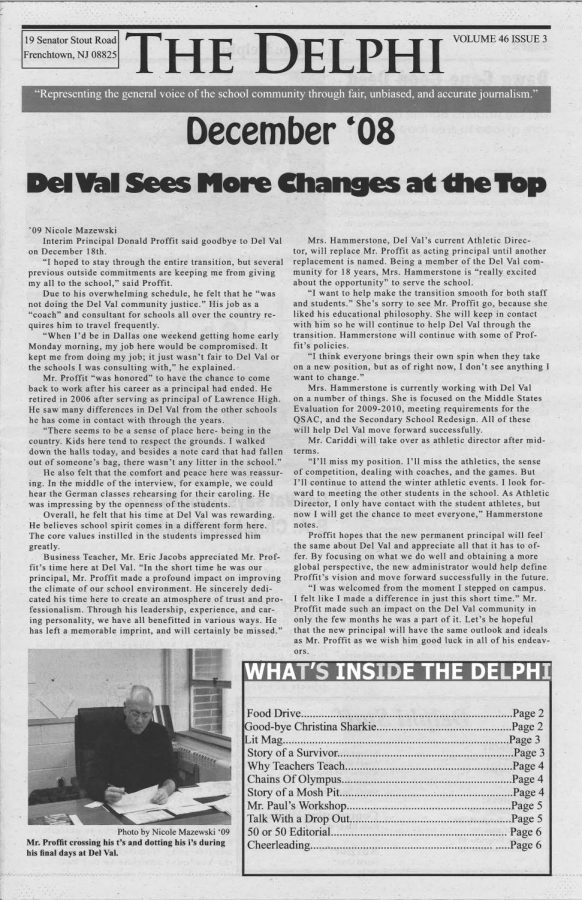Governor Murphy makes ‘electrifying’ announcement
Del Val’s parking lot will need charging stations for electric vehicles after New Jersey takes aim at limiting carbon emissions in 2035.
On Wednesday, Feb. 15, New Jersey governor Phil Murphy rolled out an ambitious, environmentally-focused plan for the Garden State. His proposal has been met with much criticism, but it is a step in the right direction when it comes to combating climate change.
The most prominent feature of the plan was the goal to ban sales of all new gas-powered vehicles by 2035.
By making the announcement, New Jersey became just the sixth state to pledge to ban gas-powered vehicles in the distant future. California’s governor, Gavin Newsom, was the first to make this move, and several states such as New York and Oregon abruptly followed suit.
Even though imposing these kinds of environmental policies seems to be nothing new to New Jerseyans, New Jersey still remains one of the most environmentally-focused states.
“New Jersey often is ahead of things environmentally, and we’re the only state in the country who has climate change standards,” said Del Val environmental science teacher Stacy Grady. “We’ve kind of been on the cutting edge.”
New Jersey often is ahead of things environmentally, and we’re the only state in the country who has climate change standards.
— Stacy Grady
It’s clear that electric-powered vehicles are becoming the future of the auto industry, and with each passing year, more companies such as Chevrolet, Toyota and Volkswagen are releasing their own takes on these vehicles.
Even though EVs are becoming more available, their prices still remain higher than gas-powered vehicles. Sales numbers show that gas vehicles are still heavily preferred by the public. Last year, only about 3 percent of New Jersey vehicle sales were related to EVs.
Statistics aside, Murphy’s plan, as well as similar ones, have been met with high praise as well as immense backlash.
A notable example of this occurred in France. In 2018, French president Emmanuel Macron unveiled a ‘green tax,’ a tax on carbon based fuels such as coal or oil. By doing so, Macron hoped the French people would be more motivated to switch to EVs. However, the exact opposite occurred.
Revolts broke out across the nation and protestors sporting yellow vests swarmed the streets of Paris. This ‘yellow-vest’ movement, made up of those in the lower and middle classes, were infuriated by Macron’s proposal. These protests turned violent, with rioters attacking French authorities as well as vandalizing, looting and defacing French monuments such as the Arc de Triomphe.

It is important to note that these protestors were not specifically against combating climate change, which was the goal of Macron’s green tax. They just opposed forcing those, especially those with lower-incomes, to pay heavy taxes just because they could not afford more expensive, greener alternatives.
“I think there should have been some governmental assistance regarding this [Macron’s] policy, especially for those with lower-incomes,” said Del Val senior Avery Fitz.
Although the yellow-vest movement eventually quieted down in late 2019, the ideals promoted and awareness raised during the protests have not been forgotten.
However, such policies have not spelled disaster everywhere. Countries such as Canada, Sweden and Denmark have unveiled carbon taxes of their own, mandates which have been highly effective.
What people need to remember is that these policies are about more than politics. Their main intention is to improve the conditions of the environment not just for the present generation, but also for those generations to come.
If you really look at what comes out of the tailpipe of a gas-powered car compared to what goes into the production of an electric vehicle, down the line, it is a better choice. — Stacy Grady
Although it can be argued that the energy used to power and manufacture EVs may contribute to carbon pollution, in the long run they have a much more positive impact on the environment compared to gas-powered ones. A study conducted by the University of Hawaii discovered that increased use of EVs could reduce carbon emissions by an incredible 93 percent in the next 30 years or fewer.
“If you really look at what comes out of the tailpipe of a gas-powered car compared to what goes into the production of an electric vehicle, down the line, it is a better choice,” said Grady.
EVs should prove beneficial for humans’ health as well. Studies have shown that the use of EVs lead to improved air quality and all-around better health.
Despite his intentions and the data, emotions concerning Murphy’s plan are all over the spectrum.
A main concern that New Jersey residents seem to have, especially for those in the middle and lower classes, regards the financial cost.
“I do feel that his proposal is unfair, especially because many people can’t afford electric vehicles,” said Del Val senior Juan Giraldo.
As of last summer, U.S. News reported that electric vehicles cost $18,000 more than gas ones on average.
I do feel that his proposal is unfair, especially because many people can’t afford electric vehicles.
— Juan Giraldo
However, Murphy’s proposal could, instead, have a positive effect on the price of EVs. His proposal may force EV manufacturers to lower their prices due to the notion that more models of electric vehicles are being manufactured. This effect is already in action. Tesla, often regarded to be a ‘luxury brand,’ has lowered its prices over the years due to increased competition.
However, perhaps the most pressing question for New Jersey residents is whether or not Murphy’s proposal is actually feasible. 2035 is just over a decade away. Although the world has seen significant changes and growth in the past decade, it may take more time for New Jersey to go completely green.
Although there is not much a majority of people agree on, especially regarding politics, many New Jersey residents must come to the consensus that Murphy’s proposal is a step in the right direction. Proposals like his should help lay the groundwork for a better future for all.
“I do feel that his proposal is doable due to just how quickly technology is advancing,” said Giraldo.
Your donation will support the student journalists of Delaware Valley Regional High School. Your contribution will allow us to attend conventions, purchase equipment and cover our annual website hosting costs.

Ellen Jordan is currently a freshman at Del Val. This is her first year writing for The Delphi. Ellen is involved with the high school soccer team and...

Julia Burchill is a junior at Del Val and is an active member of the theatre community. She is also involved in several extracurricular activities, including...

Jack Hancsin is a freshman at Del Val. Jack graduated from the Alexandria School District and is looking forward to having a successful time at Del Val....





















































































